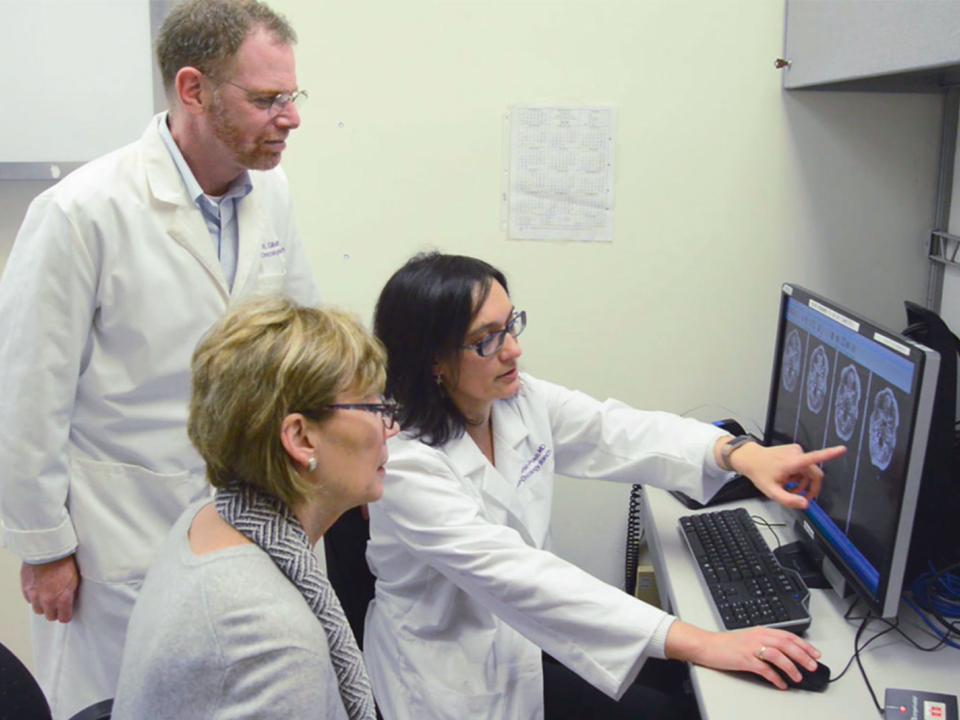Have your doctor reach out to discuss the best options for your care. Although we are not accepting self-referrals or international patients at this time, please know your care and safety remain our top priority.
Email: NCINOBReferrals@mail.nih.gov
The NCI Center for Cancer Research’s Neuro-Oncology Branch (NOB) launched in 2000 with the goal of improving treatment and outcomes for adults with primary brain and spine tumors. To fulfill this mission, the NOB:
Our Neuro-Oncology Clinic, located at the National Institutes of Health (NIH) Clinical Center in Bethesda, Maryland, offers patients expert evaluation, examinations, tests, and imaging; advanced neurosurgery and radiation therapy; and treatments based on the genetic characteristics of a person’s specific tumor type. Patients at the NIH Clinical Center consent to participate in research studies and are treated without charge.

Have your doctor reach out to discuss the best options for your care. Although we are not accepting self-referrals or international patients at this time, please know your care and safety remain our top priority.
Email: NCINOBReferrals@mail.nih.gov
| Position | Degree Required | Contact Name | Contact Email |
|---|---|---|---|
| Postdoctoral Fellow - cancer biology, functional genomics | Ph.D. or equivalent | Chunzhang Yang | yangc2@nih.gov |
The Neuro-Oncology Branch (NOB) has developed robust scientific programs addressing critical areas of brain and spine cancer research. Our investigators translate laboratory findings into clinical trials that are designed to assess whether a treatment is working and what impact it has on the patient. Each of our research programs has the same goal: to improve brain and spine cancer patient care and outcomes.
This program encompasses a growing portfolio of therapeutic clinical trials to treat brain and spine cancer patients, as well as a series of complementary non-therapeutic studies. The NOB's extensive clinical research infrastructure enables our investigators to launch critical studies, including Phase 0 studies using both microdialysis techniques and post-treatment tumor resection to determine tumor drug delivery; Phase I studies with pharmacokinetics and pharmacodynamics; and single arm Phase II studies.
Led by Jing Wu, M.D., Ph.D., this program develops brain and spine cancer clinical trials based on strong preclinical science and rationale. For example, Dr. Wu's studies with the multi-kinase inhibitor TG02 have led to the creation of a successful Phase I trial. The Translational Research Program is also investigating the malignant transformation and hypermutation that occurs in a subset of patients harboring IDH-mutated gliomas. This translational research complements the Cancer Metabolism Research Program, translating preclinical models and imaging biomarkers into clinical trials.
Led by Zhengping Zhuang, M.D., Ph.D., this program was founded on Dr. Zhuang's longstanding interest and expertise in evaluating hypoxia and pseudohypoxia, as well as the role of HIF2α abnormalities in brain and spine cancer biology. The Cancer Stem Cell Biology Program's ongoing research is focused on understanding the functional impact of genetic changes that may uncover early disease states and potential therapeutic opportunities.
Led by Chunzhang Yang, Ph.D., this program investigates the biological impacts of cancer-associated IDH mutations to uncover selective vulnerabilities in brain and spine cancers. Dr. Yang's research has demonstrated that DNA repair pathways are compromised in IDH-mutated cells, and that Nrf2-mediated metabolic pathways—such as glutathione de novo synthesis—support these cells by relieving metabolic stress and oxidative damage. These studies may have a direct link to clinical studies, as researchers in the Translational Research Program are developing a robust therapeutic program for patients with IDH-mutated tumors.
Led by Mioara Larion, Ph.D., this program studies the effects that IDH mutations have on tumor metabolism, with a particular focus on gliomas. Specifically, Dr. Larion is exploring the impact that IDH mutations have on cellular requirements for carbon sources; lipid metabolism at the molecular, organelle, and cellular levels; and the preclinical development of hyperpolarized MRI using 13C substrates to measure in vitro metabolic flux. Her research complements the cell biology-focused Molecular and Cell Biology Program and the clinical research on IDH-mutant tumors performed in the Translational Research Program.